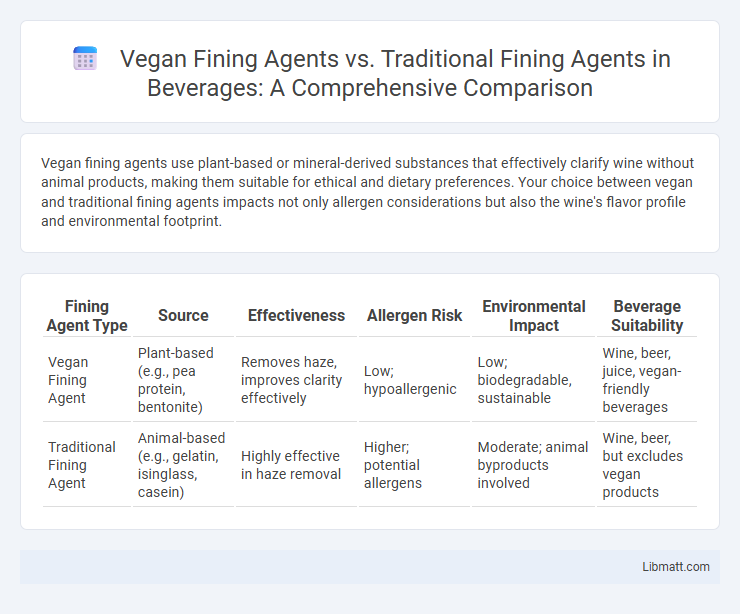Vegan fining agents use plant-based or mineral-derived substances that effectively clarify wine without animal products, making them suitable for ethical and dietary preferences. Your choice between vegan and traditional fining agents impacts not only allergen considerations but also the wine's flavor profile and environmental footprint.
Table of Comparison
| Fining Agent Type | Source | Effectiveness | Allergen Risk | Environmental Impact | Beverage Suitability |
|---|---|---|---|---|---|
| Vegan Fining Agent | Plant-based (e.g., pea protein, bentonite) | Removes haze, improves clarity effectively | Low; hypoallergenic | Low; biodegradable, sustainable | Wine, beer, juice, vegan-friendly beverages |
| Traditional Fining Agent | Animal-based (e.g., gelatin, isinglass, casein) | Highly effective in haze removal | Higher; potential allergens | Moderate; animal byproducts involved | Wine, beer, but excludes vegan products |
Introduction to Fining Agents in Winemaking
Fining agents in winemaking are substances added to clarify and stabilize wine by removing unwanted particles such as proteins, phenolics, and tannins. Traditional fining agents often include animal-derived materials like isinglass, gelatin, and casein, which effectively bind to impurities but may raise allergen concerns. Vegan fining agents, such as bentonite clay, pea protein, and activated charcoal, provide alternative plant-based options that ensure clarity without compromising vegan or allergen-friendly wine production.
What Are Traditional Fining Agents?
Traditional fining agents in winemaking typically include substances like egg whites, gelatin, casein (milk protein), and isinglass (fish bladder protein) that help clarify and stabilize wine by binding and removing unwanted particles. These agents effectively reduce haze, off-flavors, and tannins, enhancing the wine's clarity and taste. You may prefer vegan fining agents if avoiding animal-based products is important to your winemaking process or personal values.
Common Animal-Derived Fining Agents Explained
Common animal-derived fining agents include gelatin, isinglass, casein, and egg whites, which are traditionally used to clarify and stabilize wine by removing proteins, tannins, and other unwanted particles. Vegan fining agents such as bentonite clay, activated charcoal, and pea protein serve as effective alternatives without compromising on wine clarity or flavor profile. Choosing vegan fining agents supports ethical preferences while maintaining your beverage's quality and appearance.
Vegan Fining Agents: Definition and Types
Vegan fining agents are plant-based or mineral-derived substances used to clarify beverages without animal products, ensuring suitability for vegan consumers. Common types include bentonite clay, pea protein, activated charcoal, and silica gel, each targeting specific wine or beer impurities like tannins, proteins, and haze-causing particles. Choosing the appropriate vegan fining agent preserves Your beverage's clarity and flavor profile while adhering to ethical and dietary preferences.
Key Differences Between Vegan and Traditional Fining Agents
Vegan fining agents, such as pea protein, bentonite, and activated charcoal, differ from traditional fining agents like isinglass, gelatin, and casein primarily in their source, with vegan agents derived from plants or minerals, making them suitable for animal-free diets. Traditional fining agents, often animal-based, can cause allergen concerns and are not suitable for those following vegetarian or vegan lifestyles. The effectiveness in removing tannins, proteins, and phenolic compounds varies, with vegan fining agents offering comparable clarity and stability without compromising ethical or dietary preferences.
Benefits of Opting for Vegan Fining Agents
Vegan fining agents, derived from plant-based or mineral sources, offer a sustainable alternative to traditional animal-based fining agents like gelatin or isinglass, reducing ethical concerns and allergen risks. These agents enhance wine clarity and flavor stability while aligning with vegan and environmentally conscious consumer demands. Opting for vegan fining agents supports cruelty-free production practices and broadens market appeal to health-conscious and ethical consumers.
Impact on Wine Quality and Flavor Profile
Vegan fining agents, such as bentonite clay and pea protein, effectively clarify wine without altering its natural flavor profile, preserving the wine's original aroma and taste. Traditional fining agents like egg whites and casein can strip away certain tannins and flavors, sometimes resulting in a softer but less complex wine. Choosing a vegan fining agent helps maintain your wine's authentic character while meeting dietary preferences and ethical standards.
Sustainability and Environmental Considerations
Vegan fining agents, derived from plant-based or mineral sources such as pea protein, bentonite, or activated charcoal, offer a more sustainable alternative to traditional agents like gelatin, isinglass, or casein, which originate from animal by-products. These vegan agents reduce reliance on animal agriculture, thereby lowering greenhouse gas emissions, water usage, and land degradation associated with meat production. The biodegradability and lower environmental impact of vegan fining agents contribute significantly to eco-friendly wine production and align with growing consumer demand for sustainable and cruelty-free products.
Consumer Trends Toward Vegan Winemaking
Consumer trends show a growing demand for vegan fining agents in winemaking as more individuals seek plant-based and allergen-free alternatives to traditional animal-derived products like isinglass, casein, and gelatin. Vegan fining agents such as pea protein, bentonite clay, and activated charcoal maintain wine clarity and stability while aligning with ethical, environmental, and health-conscious values driving market growth. This shift reflects increasing awareness of sustainability and transparency in wine production, influencing wineries to adopt cruelty-free methods to attract vegan and eco-conscious consumers.
Future Outlook: Innovations in Vegan Wine Clarification
Innovations in vegan fining agents focus on leveraging plant-based proteins, such as pea and potato-derived compounds, to enhance wine clarification without compromising flavor or clarity. Emerging technologies aim to optimize these agents' binding capacities and reduce allergen risks, presenting an eco-friendly alternative to traditional animal-based fining agents like gelatin and isinglass. Your choice to use vegan fining agents supports sustainable winemaking practices and aligns with consumer demand for ethically produced wines.
Vegan fining agent vs traditional fining agent Infographic

 libmatt.com
libmatt.com